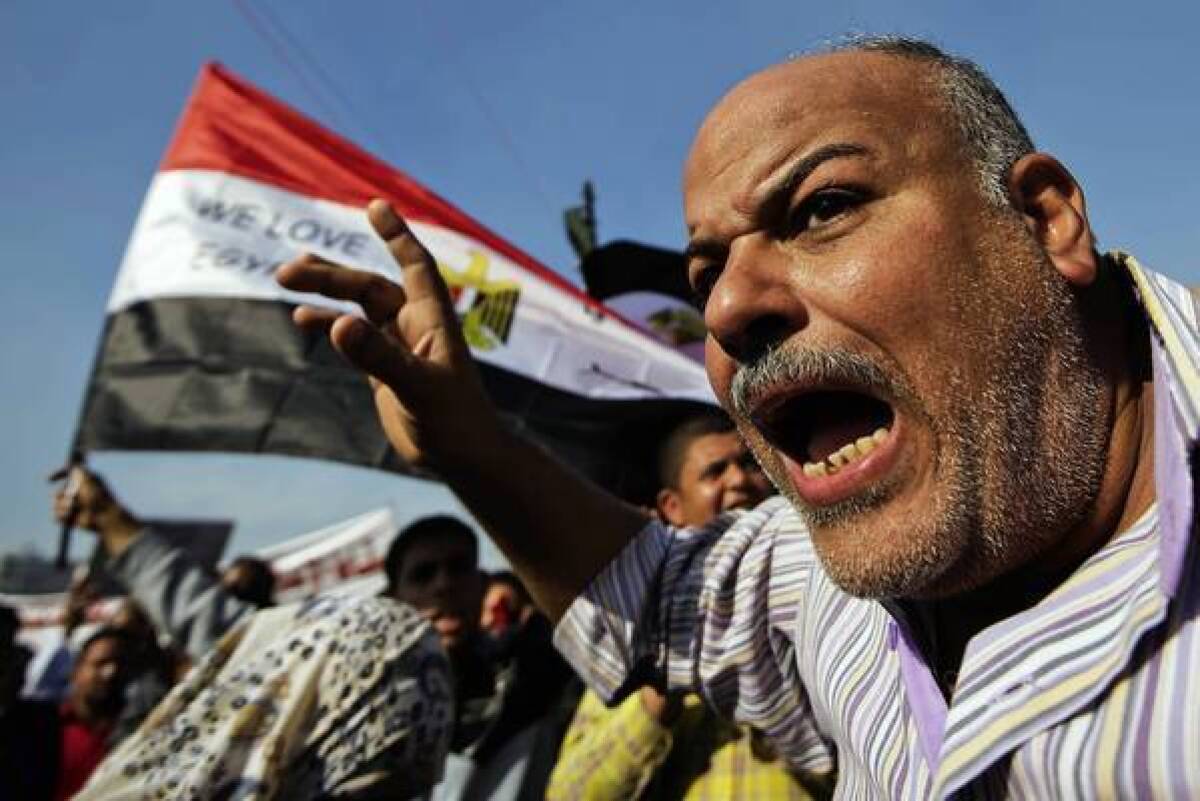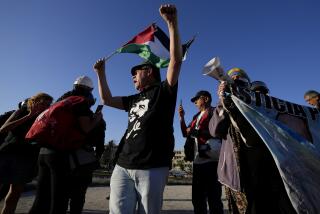Egypt protests intensify after passage of draft constitution

- Share via
CAIRO — Egypt awoke to widening protests Friday from a resurgent opposition testing a president who refuses to rein in his power while he presses for an unpopular constitution drafted by an Islamist-dominated assembly.
President Mohamed Morsi is defending his expanded authority and the proposed constitution as necessary to hold parliamentary elections and advance Egypt’s political transition. But opposition groups accuse him and the Muslim Brotherhood of pushing an authoritarian agenda that has failed to inspire an Arab world undergoing great change.
Tens of thousands of demonstrators in Cairo’s Tahrir Square gained new outrage after the nation’s constitutional assembly, in a rushed session, approved a draft charter just after dawn. The proposal could go before voters in a referendum as early as mid-December, despite complaints from opposition leaders that the document edges the nation closer to Islamic law and does not represent all Egyptians.
Nearly two years ago, Egyptians put aside their differences and brought down longtime autocrat Hosni Mubarak, promising to be an example to a region demanding new political order. The tents and placards that have returned to Tahrir are at once symbols of defeat and signals that a revolution has been revived amid calls for new momentum by opposition groups, which for now are demonstrating a once-elusive cohesion.
The Egyptian Independent newspaper ran a picture of young protesters staring into a street fire with the headline “Now What?”
“I didn’t sleep in the streets of Tahrir in the past to have a constitution cooked up by one segment of society,” said Ahmed Saeed, a business owner. “This is too much. If this constitution is passed, Egypt will become a Brotherhood nation.”
Thousands of protesters streamed into streets and squares in Alexandria; the mill town of Mahalla, which has a strong labor movement; and other cities. Marches converged on Tahrir Square from across Cairo after Friday prayers, and the Free Egyptians Party, founded by Coptic Christian billionaire Naguib Sawiris, strung a banner that read, “Egypt is for all Egyptians.”
Morsi, appearing confident in a TV interview Thursday night, indicated he would keep the broad powers he gave himself by edict last week, including placing his office above judicial oversight, until the referendum. It is unclear how the Supreme Constitutional Court, dominated by Mubarak-era judges, will react. The court was expected Sunday to rule on the legitimacy of the constitutional assembly, but now that the draft charter is finished that decision may be moot.
But Morsi and the Islamists face a defining test: Can the Muslim Brotherhood tap its historically strong grass-roots support to rally a wary public around a constitution that many criticize as a document of political circumstance rather than a poetic distillation of the nation’s character?
Morsi barely won half the vote in June when he ran for president against a Mubarak loyalist, raising questions about the Brotherhood’s popularity even with the poor. The organization is expected to hold a huge rally Saturday in Cairo to support Morsi. It had planned to march to Tahrir but changed venues, saying it wanted to avoid clashes with antigovernment protesters.
“There’s increased resentment against Morsi’s power grab,” said Heba Morayef of Human Rights Watch in Egypt. “But there may be a tendency for people who live in uncertainty to approve the constitution because the alternative is unknown. We may see a middle non-Islamist Egypt vote yes for the constitution.”
Such is the political limbo Egypt has become as courts go on strike, the stock market wobbles, prices rise and power outages skip across cities and villages amid whispers of new gas and water shortages and a paring back of government subsidies.
The constitution has provisions many Egyptians accept, including a two-term limit on the presidency and upholding political and economic rights. But secularists and liberals say vague wording in certain articles and a provision that requires the parliament to consult Al Azhar mosque on legislation related to Islamic law may constrain freedom of expression and rights for religious minorities and women.
Those concerns are what have kept the tents in Tahrir and brought back to the square leading opposition figures, including Nobel Peace Prize laureate Mohamed ElBaradei. He inspired young Egyptian activists leading the uprising against Mubarak, but ElBaradei lost credibility when he appeared to prefer tweeting to public rallies. His return to the streets, along with other prominent figures, has given the thousands in the square a sense of leadership.
If Morsi’s decree is “not withdrawn, we will call for civil disobedience. As for the constitution, we will call for a no vote if it is put to referendum,” Abdel Rabie, an opposition figure, was quoted as saying by the Ahram Online news website. “How can we pass a constitution written in the absence of representatives of 80% of Egyptians — workers and farmers?” he asked.
Many say sustained protests will further damage the credibility of the Islamists.
“The Muslim Brotherhood and Morsi can never call themselves a revolutionary power anymore,” said Saeed. “Their popularity in Egypt’s street has diminished. They are almost alone now. People’s approval for them has died out because they’ve lied one lie after another.”
Abdellatif is a special correspondent.
More to Read
Sign up for Essential California
The most important California stories and recommendations in your inbox every morning.
You may occasionally receive promotional content from the Los Angeles Times.














